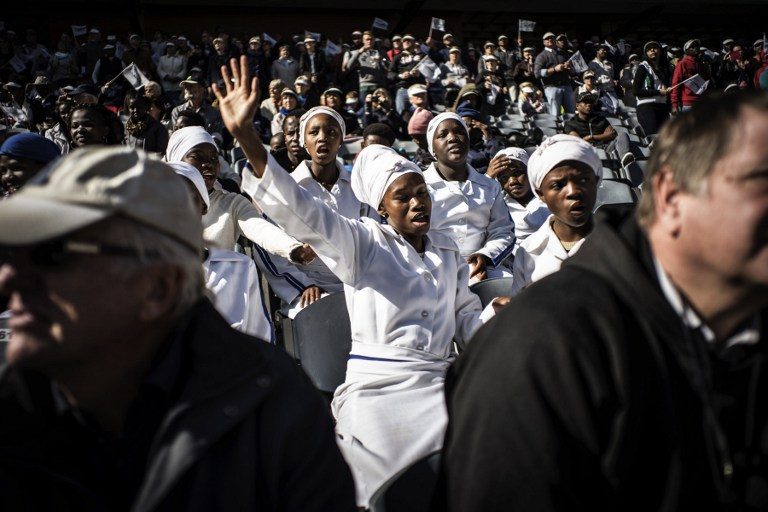SUMMARY
This is AI generated summarization, which may have errors. For context, always refer to the full article.

SOWETO, South Africa – Hundreds of South Africans, including for the first time white apartheid era conscripts, on Saturday, June 11, united to commemorate the 40th anniversary of the Soweto uprising.
“They tried to march, they were stopped, they were killed, (but) today, the police are here to help us march,” said cleric and ANC stalwart Frank Chikane as two policemen on horseback – one black, one white – escorted a procession of people into the stadium.
The uprising, in which at least 170 people were killed, was a turning point in the anti-apartheid struggle, bringing the injustices of the regime to the world’s attention and paving the way for the 1994 election of Nelson Mandela as South Africa’s first black president.
“1976 – I was there as a student…,” read one handwritten placard held up by a black woman in the crowd, as a group of Johannesburg municipal workers dressed in yellow work clothes sang and swayed in unison.
Apartheid era army personnel belonging to the South African Defense Force Association, also attended, dressed in blazers and ties decorated with the organization’s insignia.
“We are sad about what happened 40 years ago, we are sorry if people are still hurt. But… it is time we start with a new era,” said association chairman Jan Malan.
“We can be apologizing for 100 years, it is not going to change things. Let’s take the symbolism of 40 years and let’s start creating the South Africa we want,” he said.
Killed for a fist clench
At least 400 people – almost evenly divided between blacks and whites – gathered at Orlando Stadium in Soweto township for the ceremony ahead of the main government-led commemorations due to be to attended by President Jacob Zuma on Thursday, June 9.
The former white conscripts, who were not deployed to Soweto in 1976, attended the commemoration for the first time. Former police officers who did take part in the crackdown however declined to be part of the ceremony.
On June 16, 1976, security forces opened fire on black youngsters protesting in Soweto township against a government order that schools could only teach in the Afrikaans language used by whites.
Over the following 3 days, scores of people were killed, with some estimates putting the death toll at several hundred over one month.
Survivor Trofomo Sono, 59, said the students were taken aback by the security forces’ response.
“We did not expect that somebody could just die from marching and a fist clench. But it happened, a boy died, children started running,” he said.
Joy Rabotabi, 56, a former student and black South African businessman, said it was “unfortunate” the police who took part in putting down the 1976 protests boycotted the event.
“It is not contributing positively towards nation-building and reconciliation. We need to find a way to bring closure,” he told Agence France-Presse (AFP).
But he lauded the presence of the former soldiers at the event as positive. “Any step towards reconciliation and healing needs to be welcomed,” he said.
Old wounds remain
Earlier a small group of around 100 ex-students, former conscripts, clerics and Johannesburg mayor Parks Tau marched from Madibane High School in the township to Orlando Stadium.
At the school a plaque was unveiled in memory of Abiel Lebelo, a student leader who was shot dead by the police during the protests.
“We are completing the journey the students could not complete,” said the Reverend Frank Chikane.
In 1976, the students carried placards that read “Afrikaans stinks” and “To hell with Afrikaans” but on Saturday survivors waved placards reading “Unity in diversity” and “Let’s all stand together as one.”
Some relatives of victims of the uprising, however, stayed away from the event, a sign of still unhealed wounds amid frustration at post-apartheid South Africa’s failure to meet expectations of many black people.
Divisions along racial lines still linger in South Africa, with most black people enduring worse education, housing, and unemployment than white people. – Rappler.com
Add a comment
How does this make you feel?
There are no comments yet. Add your comment to start the conversation.